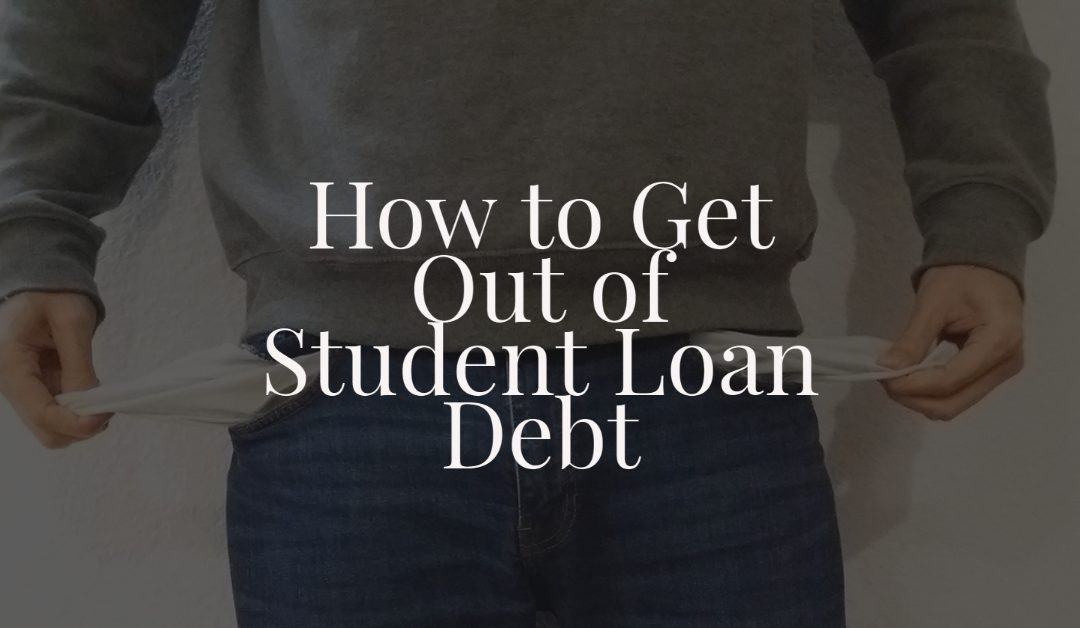Over 44 million Americans have student loan debt, according to a 2018 report by the Federal Reserve Bank of New York. The total amount of student loan debt is more than $1.47 trillion, as of the end of 2018.
Student loan debt in America is greater than credit card debt or auto loan debt in America.
If you are struggling to make your student loan payments, you are not alone. More than 10% of student borrowers defaulted on their student loans in 2018.
If you are looking for a way out of your student loan debt, keep reading.
Can You Get Out of Student Loan Debt Legally?
Unfortunately, you can’t declare bankruptcy to get out of student loan debt. In very rare cases, you may be able to qualify for an undue hardship. In 2005, laws were passed that made it impossible to declare for bankruptcy to get out of paying your student loans, except for in very specific circumstances.
Handing out loans is risky for both the government and for the private lenders who offer student loans. Student borrowers often have little to no credit yet to support their repayment.
If lenders were going to determine the interest rate for repayment of student loans, the rates would be much higher than they are now. So, removing the option for student borrowers to file for bankruptcy to get out of repaying student loans, puts the lenders at a slightly less risk.
The only legal way to get out of paying your student loan debt is with a student loan forgiveness program. These programs are only applicable for students who have federal loans. They also require several years of on-time payments before your loans are forgiven and even then, you usually still have to pay the taxes on your loan.
How Do I Prove Undue Hardship or Disability?
A way to get your student loans dismissed legally is to prove an undue financial hardship. You’ll be evaluated by the courts using what is known as the Brunner Test.
You will need to prove an undue hardship by meeting the Brunner Test qualifications. If you meet all the qualifications, you may be able to have your student loan debts as part of your bankruptcy.
The test will ask the following:
-
Would you be able to maintain a basic standard of living while repaying your student loans?
-
Can you prove that your undue hardship is likely to last through your repayment period?
-
Have you tried in good faith to repay your student loans?
It may also be possible to get your loans discharged without going to court. To do this you must have a permanent disability. It is very difficult to apply for a total and permanent disability discharge.
You will need to fill out forms and show the Department of Education that you are unable to earn an income now or in the future as a result of your disability.
You will need to meet one or more of these conditions to prove your inability to earn an income:
- Evaluation from a doctor
- Evidence from Veteran’s Affairs
- Proof that you are receiving Social Security Disability Insurance. You can’t apply for disability discharge until you have been disabled for at least 60 months. However, your doctor may be able to write a letter to say that your disability will last at least 60 months and that you won’t be able to work for the entire 60 months or more.
Some student loans may not give you the option to discharge, even if you are permanently disabled. You may be able to discharge your federal student loans because of disability but you may not be able to with a private student loan.
If you are permanently disabled and looking to get out of private loans, you will most likely have to go to court with your lender.
Is There a Way to Make My Loans Cheaper?
If trying to discharge your loans sounds unlikely for you, there are ways to make your student loan payments more manageable. A few alternatives can make your student loans more affordable without discharging them altogether.
With a federal student loan, you can apply for income-based repayment programs that may cap your monthly payments at between 10-20% of your income. These will depend on your eligibility and there are downsides to these plans so always be sure to do your research.
Another option would be to apply for a deferment. This will allow you to put your payments on hold until you can get through your financial hardship. However, interest may still accrue during the deferment with these plans.
Lastly, there are student loan forgiveness programs, as we mentioned earlier. These forgive your loan balance after a certain amount of time, usually after 10 years or more.
But some forgiveness programs require up to 25 years of payments. And again, you may have to pay the taxes on the amount forgiven.
Another way to make your payments more affordable would be to refinance your student loan. By refinancing, you may be able to qualify for lower interest rates which could reduce your monthly payments or save you money on interest. You can even change the term length on your student loans.
Next Steps to Get Out of Student Debt
Student debt can keep you bound up with worry and not knowing where to turn or who can help.
The consumer rights attorneys at LawZebra are passionate about helping those who are being hurt by companies taking advantage of consumers. Contact an attorney to find out which of the options are right for your situation. There is a way through this time in your life and we can help.

